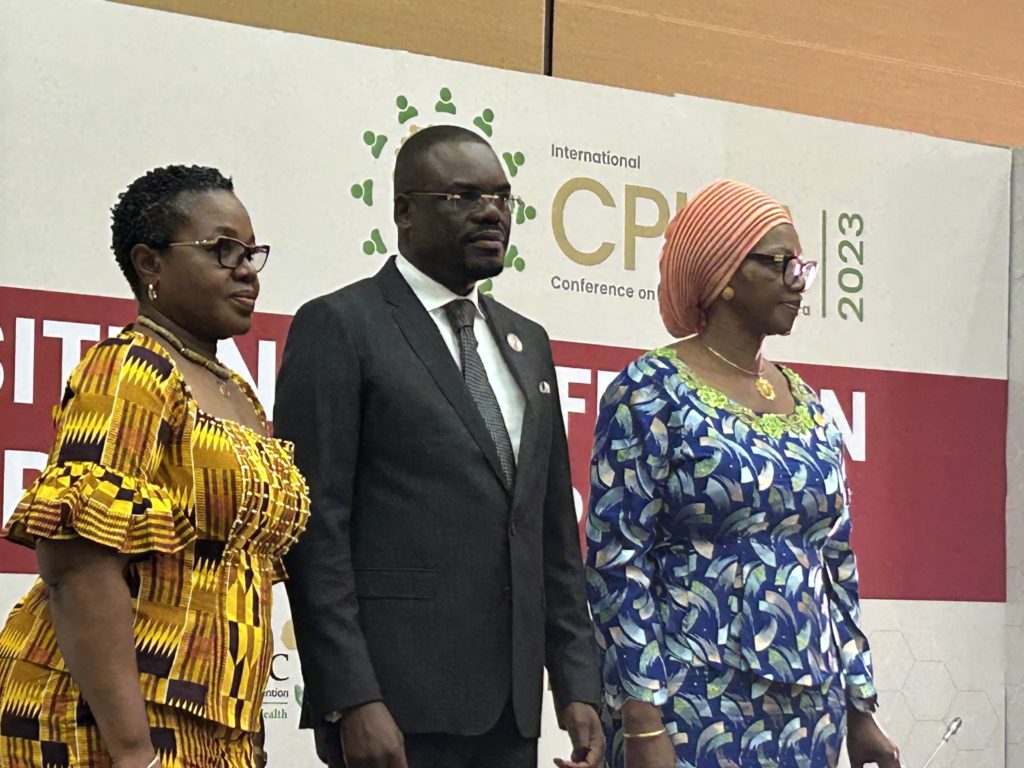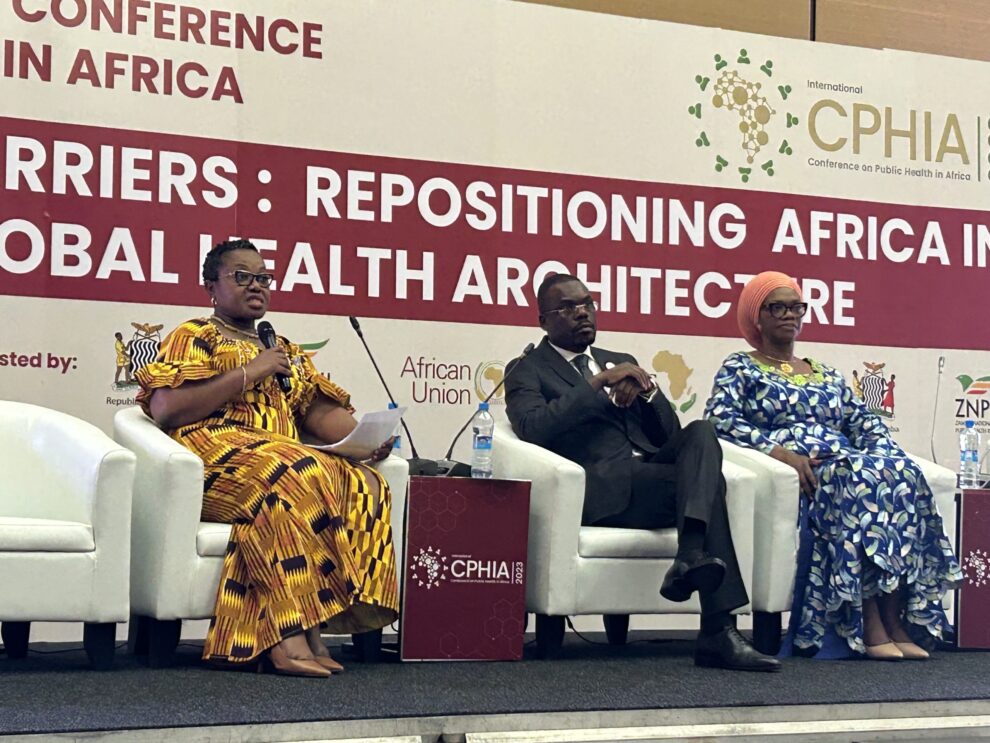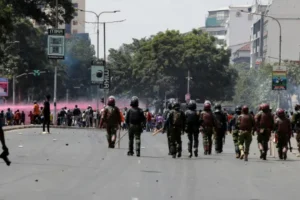LUSAKA, Zambia – Ensuring that Africa can manufacture its own vaccines will represent “the second independence of Africa”, Dr Jean Kaseya, Director General of the Africa Centre for Disease Control and Prevention (Africa CDC), said at the start of the Conference for Public Health in Africa 2023 (CPHIA) on Monday.
“Many African countries got their independence [from colonisers] in the 1960s, but we saw in COVID that we are not independent,” Kaseya told a media briefing shortly before CPHIA’s opening. “Other continents locked their doors and we were left beyond.”
With over 5,000 in-person delegates and an additional 20,000 virtual participants in attendance, Kaseya described CPHIA23 as the largest global public health event outside the annual World Health Assembly.
Stung by Africa’s inability to access COVID-19 vaccines during the pandemic’s peak as wealthy countries hoarded supplies, African heads of state have committed the continent to manufacture 60% of the vaccines it needs by 2040.
This is a mammoth task considering Africa currently produces only 1% of its vaccines. Although many believe this impossible to achieve, Kaseya said he would not be in his current position if he did not believe it was possible.
The Partnerships for African Vaccine Manufacturing (PAVM) is driving this ambition, which recently received a huge shot in the arm from the global vaccines platform, Gavi, according to Kaseya.
Gavi’s policy committee has approved a $1 billion investment in a partnership with the Africa CDC to support the development of African vaccine manufacturers. This decision will be discussed by the body’s board in December, Kaseya added.
The Mastercard Foundation is also playing a major role in supporting Africa CDC and African countries to build their capacity to vaccinate their populations.
The Mastercard-sponsored ‘Saving Lives and Livelihoods initiative’ is focused on vaccinating high-risk populations, integrating the COVID-19 response into routine immunisation and preparing for potential future pandemics.

One more step to ‘decolonise’ research
However, Dr John-Arne Røttingen, Norway’s Ambassador for Global Health and Wellcome Trust CEO designate, said that improving manufacturing “isn’t enough” as Africa needs to build an entire “biomedical system”.
Addressing the opening plenary, Røttingen said that global health had come a long way since the era of colonial researchers but that this process of “decolonisation” needed one more step – “African health research systems led by Africans”.
“It is not just about the undoing but the doing,” urged Røttingen.
Also addressing the plenary, World Health Organization (WHO) Director-General Dr Tedros Adhanom Ghebreyusus said that he was elected as the first African head of the global body because the continent stood together to support one nomination.
Subsequently, this unity had enabled Africans to be elected to head the World Trade Organization, UNAIDS, the International Labour Organisation and other UN bodies, he added.
“It is very important for Africa to continue to be united,” Tedros urged.
Meanwhile, Kaseya said that the Africa CDC had built “health diplomacy” between African countries.
“Even if you are fighting politically, even if you are fighting military a disease outbreak will cross the border without your permission. This is why Africa CDC has a global diplomacy department to facilitate dialogue between countries between communities and to ensure that all of them have access to support to commodities when they need them.”
African-led health initiatives
Zambia’s Minister of Health, Sylvia Maseko, said that the purpose of the conference is “to reposition Africa in the global health architecture”.
“Some of the key achievements that we have made so far include approval and launch of the Africa CDC strategic plan 2023 to 2027, which outlines a clear roadmap to address the continent’s health challenges, strengthen public health systems, and ensure a coordinated response to emerging threats,” said Maseko.
“Secondly, we have done the formation and inauguration of the new Africa CDC advisory and technical Council and we have inaugurated the new governing board of the Africa CDC, which saw me as the new chairperson,” said Maseko.
Meanwhile, CPHIA co-chair Professor Margaret Gyapong said that the continent had made major scientific advances in the last few years, including in digital disease surveillance, and building public-private partnerships.
“African scientists and researchers are leading the charge in developing groundbreaking vaccines tailored to address regional disease burdens, including malaria, tuberculosis and HIV and AIDS,” said Gyapong, who directs the Institute of Health Research at the University of Health and Allied Sciences in Ghana.
“Groundbreaking initiatives such as the RTS,S malaria vaccine demonstrates the significant contribution of African scientists and researchers in collaboration with national centres and organising for address regional disease burdens.”
Gavi’s interim CEO, David Marlow, said that the vaccine platform had set up the African Vaccine Manufacturing Accelerator to assist with the development of manufacturing capacity on the continent “and it would be ideal if malaria was a priority antigen”.

Massive debt repayment challenges
Despite the upbeat tone of the speakers, some of the challenges facing the continent were also acknowledged. Only 28% of health facilities have electricity, for example, while 70% of maternal deaths happen in Africa.
In addition, COVID-19 has decimated the already weak economies of many of the 55 African member states and many simply don’t have money to invest in their health systems.
In 2021, CPHIA host country Zambia was the first to default on its debt repayments as a result of COVID, although last month announced that it has restructured $3 billion of its international bonds with creditors. Mali briefly defaulted by has resumed payments, but Ghana has also stopped servicing its debt.
Chad, Ethiopia, and Malawi have opted to restructure their debt. However, in the process of doing so, Malawi devalued its currency by 44% earlier this month and this is likely to drive citizens in one of the world’s poorest countries further into poverty.
Climate change is also a major threat to the continent, with the African Development Bank estimating that it is losing between 5-15% of its GDP due to climate change.
“Do you know that we have 18 countries today affected by cholera that is the effect of climate change with 4000 deaths. Do you know that dengue in West Africa is also the effect of climate change?” Kaseya told the media briefing.
“You saw the flooding in Libya. Climate change is affecting us. And this is why Africa CDC decided to implement a One Health approach to address the issue of climate change, animal health and human health.”
Source : Health Policy Watch











